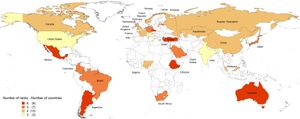We talk about global economies and global science, but when it comes to how we run our universities, higher education in the United States rarely looks outside. A joint project between the Higher School for Economics in Moscow, Russia and the Boston College Center for International Higher Education has collected data on universities in 28 countries.
Although the project’s focus is on comparisons of compensation, I found another result more provocative.  The investigators asked how many ranks are used in universities across 28 countries. It turns out that only India and Italy join the United States in designating three rungs of academic promotion.
The investigators asked how many ranks are used in universities across 28 countries. It turns out that only India and Italy join the United States in designating three rungs of academic promotion.
The most common systems is to have four ranks, but several countries used systems with five or six steps. Because number of ranks was not the focus of the study, the researchers did not make conclusions about the benefits of different systems, but it does raise the question of what promotion would be like if the choices were not simply assistant, associate, or full.
 investigators can explain the benefits of their projects and seek funding. So far the projects seem to involve wildlife conservation, which may make for more visually appealing descriptions. But any scientist can take a turn explaining the benefits of their research.
investigators can explain the benefits of their projects and seek funding. So far the projects seem to involve wildlife conservation, which may make for more visually appealing descriptions. But any scientist can take a turn explaining the benefits of their research.